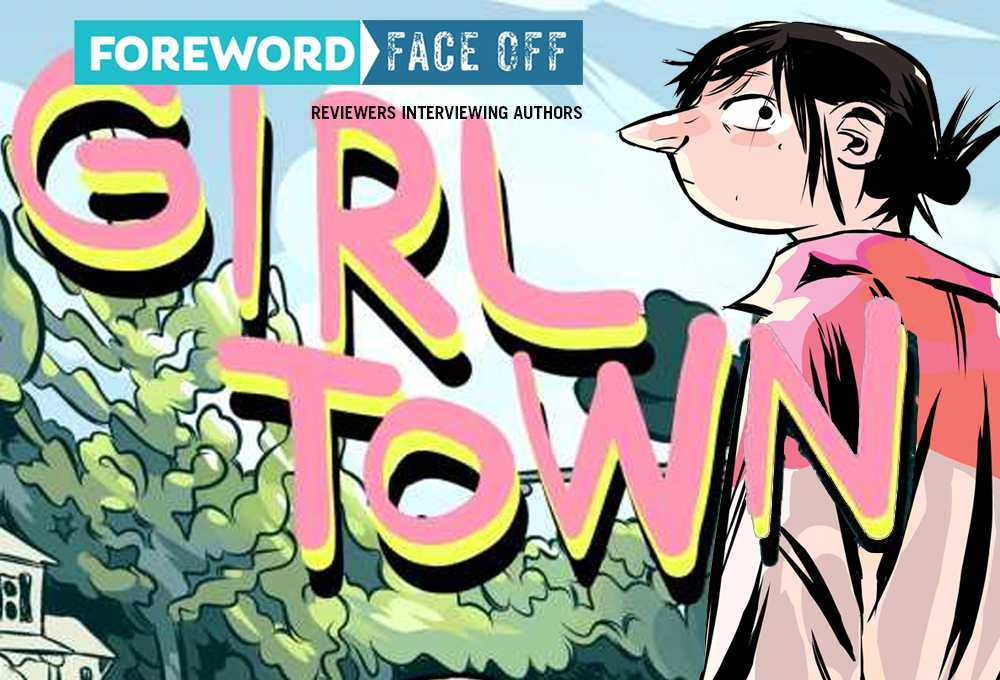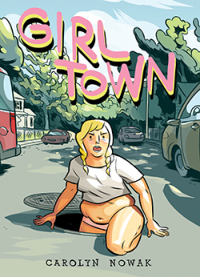Reviewer Mya Alexice Interviews Carolyn Nowak, Author of the Graphic Novel Girl Town

Not that we’d come to any conclusions, but isn’t it interesting how many quirky, eccentric, disconnected, socially-awkward people end up as writers and artists? What is it about those intensely personal creative pursuits that seems to attract outsiders?
We’ll let those questions remain rhetorical and move along to marvel at how graphic novels have served to provide a fantastically effective means for visual writers and eloquent artists to express themselves. This hybrid format of illustrated books is also beloved by a subset of visually-minded readers who, until recently, had been overlooked by the publishing industry.
And, yes, it definitely seems that a healthy percentage of graphic novels are written and illustrated by self-professed outsiders like Carolyn Nowak, author of the superb Girl Town. In the interview below, here’s how she describes her young-adult self: “I was miserable and isolated, I was 20, I didn’t know how to live at all.”
What was it that helped pull her out of that dark place: Lucy Knisley’s autobiographical comics, which were “such a bright light for me, she [Lucy] just kind of celebrated so many little things, and had such a lovely sweet life. I don’t know how I grew up and didn’t ever figure out How To Be, I don’t know if anyone is to blame but myself, but autobio like Lucy’s helped me understand what a life can look like.”
That’s the superpower known to graphic novels.

In her starred review of Girl Town in Foreword’s November/December issue, Mya Alexice calls the book “an intriguing, masterful celebration of girls and girlhood,” so we knew we had the perfect setup for a Face Off interview.
Happy holidays.
Tell us about your process for the stories in Girl Town. Do you draw first, write a script first, or a combination of the two? Also, do you finish a whole story/project before moving on to something else or do you work on multiple projects at the same time?
I’m trying to get out of this habit, but for all the stories in Girl Town I wrote meticulous scripts: “this panel has these people in it, Betsy is saying this, doing this and has this expression,” etc. I did this mostly out of fear, trying to visualize and familiarize myself with a moment as much as possible before I had to draw it. Classic avoid-the-drawing stuff everyone does. I’m going to try and put more spontaneity into my next work, since I know interesting things happen when your conscious self, the image you want to make, the paper, and the pencil all meet at the same time.
What’s your favorite story from the collection and why?
The original Girl Town mini comic—hands down. It probably never won’t be my favorite. I wrote it in a frenzy and loved it immediately even though I had no idea where it had come from or what it was even about. It’s strange to think that I only made that comic three years ago … The girls of Girl Town are mysteries to themselves, so I had a lot in common with them then. The story WAS aspirational for me—a town of mean bitches who just don’t care—now I live it. Girl Town was this wacky little leak of my best self. I’m grateful for that story every day.
What was the first comic you read that had representation of women that you could connect or identify with?
My dog-door to indie comics was actually Lucy Knisley’s collection of Livejournal autobio comics, back when she only had French Milk out. I didn’t have any women friends at the time, I was miserable and isolated, I was 20, I didn’t know how to live at all. Lucy’s blog was such a bright light for me, she just kind of celebrated so many little things, and had such a lovely sweet life. I don’t know how I grew up and didn’t ever figure out How To Be, I don’t know if anyone is to blame but myself, but autobio like Lucy’s helped me understand what a life can look like. I guess I’ll always feel close to her for that reason, I’ll always be such a Lucy Knisley geek. I remember the first time I ever interacted with her I could barely speak!! Aww.
If you had to have one electric body part, like Diana’s tongue in “Diana’s electric tongue,” what would it be?
I mean I just have really flat feet and I can’t run for shit so I’d love some new robo-feet.
Girl Town is all about women, their lives, and their relationships with others. This is such an important work, especially as we see some parts of the comics world don’t want to move on from the boy’s club it once was. Is any part of Girl Town a response to sexism you’ve seen in the industry, or perhaps in the greater world?
My high school art teacher was a major asshole—a hippie drunk who hated women, so so much … so much. He watched me like a hawk, didn’t let me get away with anything, was constantly disappointed in my attitude and work. I was already suicidally depressed, you see, and art was the only thing that gave me any kind of self-worth. I certainly had a mouth, I was lazy a lot, but I was better behaved than any boy in the class, and they were allowed to do anything they wanted without consequence.
If that sounds cartoonishly evil, well. It’s just true, and I have accounts from friends and authority figures within the school that back up my story perfectly. He picked on me, he was threatened by me, he didn’t like how rude I was. In Girl Town, the story, my fave, there’s the vague sense that the main character’s father is pleased his daughter doesn’t get to go to space—she’s safe, conventional, earthbound. There have just been so many men in my life (and yes, in comics) with power over me who would constantly, subtly beg me not to be better … and I’m better than all of them. Girl Town is a more interesting work than any of them could ever dream of creating. THAT is my response.
Anecdotally, I think often about the time I complained to that teacher that I had a headache, and he made me sit down, and he put one hand on the front of my head and one on the back, and slowly applied pressure, and it made my headache go away, but fuck.
What are you reading right now?
Oh no, to be horribly on-brand, I’m reading Elena Ferrante’s Those Who Leave and Those Who Stay, and I’m also sort of casually breakfast-reading the autobiography of Liz Renay, My Face for the World to See. I find Renay very inspiring … I dream of being that lovely, wild, and shameless.
Mya Alexice
